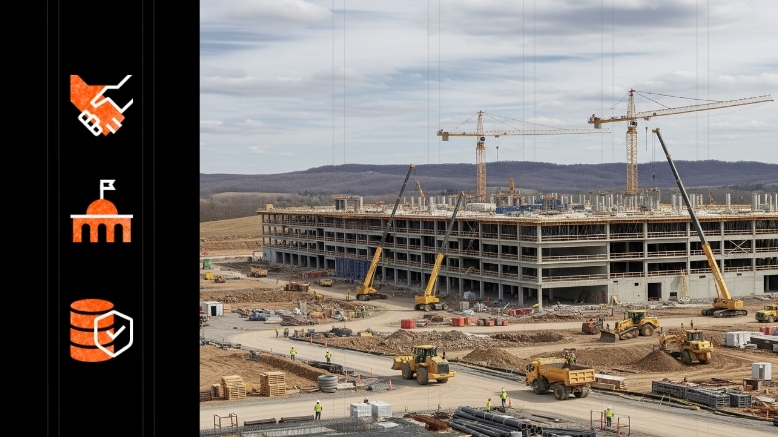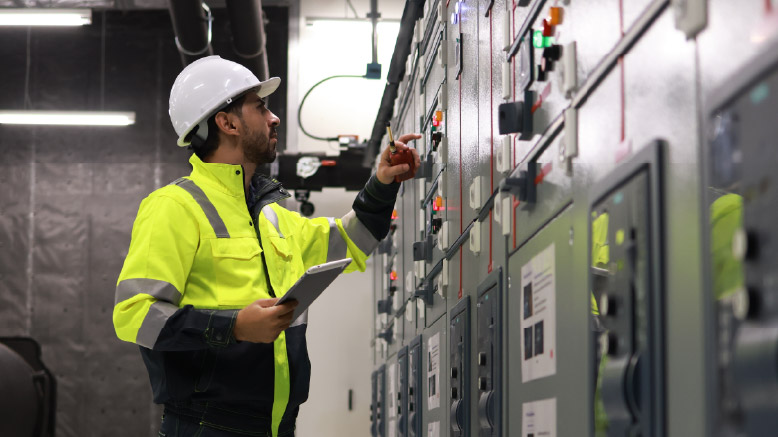— 5 min read
Tailoring Data Centers for a Future-Proof Digital Backbone


Last Updated Sep 23, 2025

Trevor Dielmann
Enterprise Solution Specialist, Data Centers
Trevor Dielmann brings a decade of experience in construction and project management to the table. His background began in general contracting, providing a solid foundation in the industry before transitioning to the semiconductor sector where he specialized in the construction of cutting-edge R&D labs specifically designed for the advancement of data center specific chipsets. Trevor’s unique blend of experiences provides a valuable perspective by fostering a deep understanding of client needs and project complexities.

Marlissa Collier
34 articles
Marlissa Collier is a journalist whose work focuses on the intersections of business, technology, policy and culture. Her work has been featured in digital and print formats with publications such as the Dallas Weekly, XO Necole, NBCU Comcast, the Dallas Nomad, CNBC, Word in Black and Dallas Free Press. Marlissa holds an undergraduate degree in Construction Engineering from California State University, Long Beach and an MBA from Southern Methodist University’s Cox School of Business.
Last Updated Sep 23, 2025

For decades, the essence of building was often defined by standard designs and repeatable processes. But now, in the burgeoning landscape of data center construction, the traditional approach to what was once “big-box construction” is facing a significant evolution.
As digital demands increase and technology accelerates at an unprecedented pace, organizations are discovering that tailored data center solutions are not merely beneficial — they are an imperative for maximizing investment and ensuring long-term operation.
Table of contents
Diverse Client Needs Drive Bespoke Solutions
The perception of a data center as a standardized, monolithic structure no longer holds true. Because each company building or utilizing these critical facilities operates with highly specific needs, their needs are fundamentally shifting the paradigm towards customization.
But investing substantial capital into a data center demands that it performs precisely as required to optimize its operational output and maximize revenue. For builders, this involves taking foundational data center building blocks and meticulously tailoring them to fit exact operational goals, moving beyond generic designs to highly specialized environments.
The compelling demand for customization stems directly from the varied operational models within the data center ecosystem.
Hyperscalers
These colossal tech entities develop data centers for their own massive, internal needs. Companies like Amazon Web Services (AWS), Microsoft Azure, and Google Cloud Platform (GCP) build vast, complex facilities all over the world.
These entities are each optimized for unique proprietary hardware, software and highly specific cooling or power demands to serve millions of users globally. Their customization is driven by an unparalleled need for scale and precision.
Powered Shell Developers
Some developers construct data centers to approximately 90% completion, leaving the final 10% flexible for future tenants. Providers like CyrusOne or QTS Data Centers may offer these "powered shell" options, which are essentially purpose-built, secure facilities with the physical structure, core power and connectivity in place — but omitting critical IT infrastructure like UPS systems, generators, and cooling.
This approach requires customization that anticipates a wide range of potential tenant requirements, balancing general utility with specific adaptability, allowing tenants to fit out the interior to their precise specifications.
Co-location Providers
These facilities host equipment for multiple tenants, each often arriving with unique operational demands. Leading co-location providers such as Equinix and Digital Realty manage massive portfolios where a single data hall might need to accommodate one tenant requiring 100% air cooling, another demanding water cooling for high-density AI workloads, and yet another a hybrid of both.
This necessitates highly flexible internal infrastructure and adaptable design from the outset, down to the granular level of individual server rack requirements.
In each scenario, the ability to customize with such precision is paramount for maximizing efficiency, ensuring consistent uptime, and ultimately, driving competitive advantage and revenue.
Every company building or using a data center has a specific need. Customization is critical because when you're spending this much money, you need the facility to do exactly what you want, which helps drive the most revenue.

Trevor Dielmann
Enterprise Solution Specialist, Data Centers
Procore Technologies
The Paradox of Pace: Designing Against Tomorrow's Technology
While customization is an imperative, it is also intrinsically linked to a significant operational challenge: the pace of technological evolution. The data center industry is evolving so rapidly that designs can quickly become suboptimal, or even functionally inferior, within months of operational launch.
This relentless innovation means construction and design teams are frequently tasked with building infrastructure for technologies that are still in their conceptual stages — in essence, designing facilities around chips that exist primarily on paper.
This gamble — the necessity for highly specific designs coupled with the profound uncertainty of future technology — creates a constant tension.
Developers and owners face the delicate balance of attempting to "future-proof" a facility without over-investing in systems that may never be fully utilized, or, conversely, designing solely to current standards only to find the facility rapidly obsolete. True customization, in this context, implies building in flexibility and adaptability, preventing technological lock-in and extending the asset's viable lifespan.
Enabling Agile Customization and Strategic Insight
Navigating a landscape of diverse requirements, rapid technological shifts, and inherent future uncertainty demands a sophisticated approach to project management and data. This is where integrated construction management platforms can become invaluable. They serve not just as construction execution tools, but as critical engines for data refinement and strategic decision-making.
True future-proofing goes hand-in-hand with customization. You cannot adapt a data center down the road if it's locked into one technological path.
Trevor Dielmann
Enterprise Solution Specialist, Data Centers
Procore Technologies
During the preconstruction phase, from initial feasibility studies through detailed design, an immense volume of data is generated. Without a centralized system, this crucial information often remains siloed, making it challenging to leverage effectively during construction and subsequent operations.
A comprehensive platform offers continuous data ownership and analytics throughout the entire construction lifecycle. This translates directly into tangible benefits:
u003cstrongu003eInformed Decision-Makingu003c/strongu003e
Stakeholders gain continuous access to real-time project data, empowering them to make agile adjustments to designs or construction plans as market needs or technologies evolve. This is fundamental for mitigating the risk of obsolescence in a fast-moving sector.
u003cstrongu003eOptimized Investment Analysisu003c/strongu003e
By providing a holistic, granular view of the construction phase, these platforms enable a clearer, data-driven analysis of investment returns. It becomes impossible to fully assess the ROI on a highly customized, multi-million dollar facility without comprehensive, accessible data from the build process.
u003cstrongu003eImproved Timelines and Qualityu003c/strongu003e
The platform centralizes workflows, streamlines communication, and automates document control. This directly contributes to more efficient project timelines and higher build quality, even for the most complex, tailored data center initiatives.
Custom Solutions Are Building the Future
Data center customization is no longer a niche consideration; it is a foundational requirement for facilities destined to serve highly specialized and rapidly evolving digital demands.
From hyperscalers like AWS demanding bespoke environments to co-location providers such as Equinix needing versatile, multi-tenant halls, the ability to tailor every aspect of a data center's design and construction directly impacts its long-term profitability and operational longevity.
Free AI in Construction Course with Hugh Seaton
Start learning today with industry expert Hugh Seaton and discover how AI can boost efficiency, reduce risk, and transform your projects.

Was this article helpful?
Thank you for your submission.
0%
0%
You voted that this article was . Was this a mistake? If so, change your vote
Scroll less, learn more about construction.
Subscribe to The Blueprint, Procore’s construction newsletter, to get content from industry experts delivered straight to your inbox.
By clicking this button, you agree to our Privacy Notice and Terms of Service.
Thank you!
You’re signed up to receive The Blueprint newsletter from Procore. You can unsubscribe at any time.
Categories:
Written by

Trevor Dielmann
Enterprise Solution Specialist, Data Centers | Procore Technologies
Trevor Dielmann brings a decade of experience in construction and project management to the table. His background began in general contracting, providing a solid foundation in the industry before transitioning to the semiconductor sector where he specialized in the construction of cutting-edge R&D labs specifically designed for the advancement of data center specific chipsets. Trevor’s unique blend of experiences provides a valuable perspective by fostering a deep understanding of client needs and project complexities.
View profile
Marlissa Collier
34 articles
Marlissa Collier is a journalist whose work focuses on the intersections of business, technology, policy and culture. Her work has been featured in digital and print formats with publications such as the Dallas Weekly, XO Necole, NBCU Comcast, the Dallas Nomad, CNBC, Word in Black and Dallas Free Press. Marlissa holds an undergraduate degree in Construction Engineering from California State University, Long Beach and an MBA from Southern Methodist University’s Cox School of Business.
View profileExplore more helpful resources

Building Intelligence: How AI & Data Are Rewiring Construction for the Digital Age
As data center construction surges to meet the demands of AI, cloud computing, weekend streaming binges and real-time digital services, the pressure being put on builders by owners has reached...

Power, Politics & Permits: The External Forces Shaping Data Center Development
As the need for digital infrastructure accelerates, data centers have become essential to powering the world’s digital economy. Yet, behind every hyperscale facility is a complex web of external forces...

The New Frontier: How Data Centers Are Pushing the Limits of Construction
The digital world never sleeps — and as such, neither can the infrastructure powering it. As demand for cloud services, artificial intelligence and streaming data continues to surge, data centers...

The Top 5 MEP Challenges of Data Centers
Data centers are unique builds that come with unique challenges. MEP contractors stepping up to build data centers are sure to encounter the complexity of systems and the demands of scalability,...
Free Tools
Calculators
Use our calculators to estimate the cost of construction materials for your next project.
Templates
Find a template to help you with your construction project tasks.
Material Price Tracker
Get the latest U.S. retail prices and view historical trends for common building materials.
Glossary
Explore key terms and phrases used in the industry.
